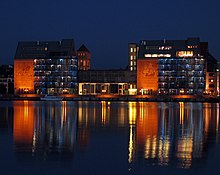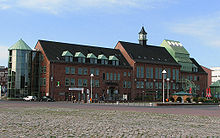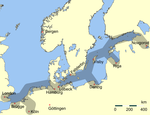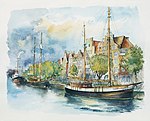Rostock
Rostock | |
|---|---|
 Hanseatic City of Rostock with St. Mary's Church | |
| Country | Germany |
| State | Mecklenburg-Vorpommern |
| District | Urban district |
| Subdivisions | 21 boroughs |
| Government | |
| • Lord mayor | Roland Methling (Ind.) |
| Area | |
| • Total | 181.44 km2 (70.05 sq mi) |
| Elevation | 13 m (43 ft) |
| Population (2022-12-31)[1] | |
| • Total | 209,920 |
| • Density | 1,200/km2 (3,000/sq mi) |
| Time zone | UTC+01:00 (CET) |
| • Summer (DST) | UTC+02:00 (CEST) |
| Postal codes | 18001–18147 |
| Dialling codes | 0381 |
| Vehicle registration | HRO |
| Website | www.rostock.de |

Rostock (German pronunciation: [ˈʁɔstɔk]), is the largest city in the north German state Mecklenburg-Vorpommern. Rostock is on the Warnow river; the quarter of Warnemünde 12 kilometres (7 miles) north of the city centre is directly at the coast of the Baltic Sea.
Rostock is home to one of the oldest universities in the world, the University of Rostock, founded in 1419.
The city territory of Rostock stretches for about 20 km (12 mi) along the Warnow to the Baltic Sea. The largest built-up area of Rostock is on the western side of the river. The eastern part of its territory is dominated by industrial estates and the forested Rostock Heath. Rostock is considered a regiopolis and is favourably located within the metropolitan regions of Hamburg, Berlin, Copenhagen-Malmö and Stettin and is close to the equally-sized city of Lübeck.
History
Early history

In the 11th century Polabian Slavs founded a settlement at the Warnow river called Roztoc (*ras-tokŭ, Slavic for "fork of a river"); the name Rostock is derived from that designation.
The Danish king Valdemar I set the town aflame in 1161. Afterwards the place was settled by German traders. Initially there were three separate cities:
- Altstadt (Old Town) around the Alter Markt (Old Market) with St. Petri (St. Peter's Church),
- Mittelstadt (Middle Town) around the Neuer Markt (New Market) with St. Marien (St. Mary's Church) and
- Neustadt (New Town) around the Hopfenmarkt (Hop Market, now University Square) with St. Jakobi (St. James's Church, now demolished).
In 1218, Rostock was granted Lübeck law city rights.
Hanseatic League

The rise of the city began with its membership of the Hanseatic League, beginning in 1251. In the 14th century it was a powerful seaport town with 12,000 inhabitants and the biggest city of Mecklenburg. Ships for cruising the Baltic Sea were constructed in Rostock. The formerly independent fishing village of Warnemünde at the Baltic Sea became a part of Rostock in 1323, to secure the city's access to the Baltic Sea.
In 1419, one of the earliest universities in Europe, the University of Rostock, was founded.
15th to 18th century
At the end of the 15th century the dukes of Mecklenburg succeeded in enforcing their rule over the town of Rostock, which had until then been only nominally subject to their rule and essentially independent. They took advantage of a riot known as Domfehde, a failed uprising of the impoverished population. Subsequent quarrels with the dukes and persistent plundering led ultimately to a loss of economic and political power.

In 1565 there were further clashes with Schwerin that which had far-reaching consequences. Among other things, was the introduction of a beer excise that favoured the dukes. John Albert I advanced on the city with 500 horsemen, after Rostock had refused to take the formal oath of allegiance, and had the city wall slighted in order to have a fortress built. Not until the first Rostock Inheritance Agreement of 21 September 1573, in which the state princes were guaranteed hereditary rule over the city for centuries, binding Rostock for a long time, and recognizing them as the supreme judicial authority, was the conflict ended. The citizens slighted the fortress the following spring. From 1575 to 1577 the city walls were rebuilt, as was the Lagebusch tower and the Stein Gate in the Dutch Renaissance style. The inscription sit intra te concordia et publica felicitas, which can still be read on the gate, refers directly to the conflict with the Duke. In 1584 it finally came to the Second Rostock Inheritance Agreement, which resulted in a further loss of former tax privileges. At the same time, these inheritance contracts put paid to Rostock's ambition of achieving imperial immediacy as Lübeck had done in 1226.
The strategic location of Rostock provoked the envy of its rivals. Danes and Swedes occupied the city twice, first during the Thirty Years' War (1618–48) and again from 1700 to 1721. Later, the French, under Napoleon, occupied the town for about a decade until 1813. In nearby Lübeck-Ratekau Blücher (who was born in Rostock and who was one of few generals to fight on after the Battle of Jena) surrendered to the French in 1806. This was only after furious street fighting in the Battle of Lübeck, in which he led some of the cavalry charges himself; the exhausted Prussians had, by the time of the surrender, neither food nor ammunition.
19th century

In the first half of the 19th century Rostock regained much of its economic importance, at first due to the wheat trade, and, from the 1850s, to industry, especially to its shipyards. The first propeller-driven steamers in Germany were constructed here.
The city grew in size and population, with new quarters emerging in the south and west of the ancient borders of the city. Two notable developments were added to house the increasing population at around 1900:
- Steintor-Vorstadt in the south, stretching from the old city wall to the facilities of the new Lloydbahnhof (Lloyd Railway Station, now Rostock Hauptbahnhof). It was designed as a living quarter and consists mostly of large single houses, once inhabited by wealthy citizens.
- Kröpeliner-Tor-Vorstadt in the west, designed to house the working population as well as smaller and larger industrial facilities such as Mahn & Ohlerich's Brewery (now Hanseatische Brauerei Rostock). The main shipyard, Neptun, was nearby at the shore of the river.
20th century


In the 20th century, important aircraft manufacturing facilities were situated in the city, such as the Arado Flugzeugwerke in Warnemünde and the Heinkel Works with facilities at various places, including their secondary Heinkel-Süd facility in Schwechat, Austria — the original Heinkel firm's Rostock facilities being named Heinkel-Nord. It was at their facilities in Rostock-Marienehe (today's Rostock-Schmarl) that the world's first airworthy jet plane prototype made its test flights. Airplane construction ceased at the end of the Second World War.
Large parts of the central city were destroyed in World War II by Allied bombing in 1942 and 1944. After the war through reconstruction and subsequent extension, the city became a major industrial centre of the German Democratic Republic (GDR) with the port being developed as the state's primary gate to the world. Much of the historic centre has been faithfully rebuilt and much of its historic character restored. This includes several buildings characterised by vertical brick ribs, a style common to the Hanseatic towns.
Following the reunification of Germany in 1990, Rostock lost its prior privileged position as the principal overseas port of the former GDR and became one of several German ports, now located in one of the least industrialised regions of reunited Germany. Despite large infrastructure investments, the city's economy declined in the 1990s but is now growing again.
Rostock's population dropped from nearly 260,000 in 1989 to about 200,000 today, primarily due to suburbanisation but also due to emigration to more prosperous western regions of Germany.
| Rank | Nationality | Population (2012) |
|---|---|---|
| 1 | 906 | |
| 2 | 772 | |
| 3 | 693 | |
| 4 | 343 | |
| 5 | 289 |
Politics
Districts
Symbols


Rostock has had three different coats of arms, known as the Signum, the Secretum and the Sigillum. The Signum, which can be traced back to 1367, was developed last and is to this day the coat of arms of the city.
The Signum depicts a golden griffin on a blue background, with bars of silver and red, the colors of the Hanseatic League, below. It can be seen not only on flags and houses, and at bus stops, but also on bridges, gullies, fences, ships and restaurants.
Administration
Since the 13th century, the governing body of the city has been the city council (Rat), first consisting of ten, later of 24 aldermen (Ratsherren). The chairman of the city council was the city mayor. In the 19th century there were even three mayors. Since 1925, the head of the city has born the title of Lord Mayor. Having been elected for centuries by the city council, he is now elected directly by the citizens of Rostock, following a reform in 2002.

The city parliament (Bürgerschaft) represents the citizens. Representative are elected for five years. The number of representatives is currently 53.
The city parliament is presided by the Präsident der Bürgerschaft. He heads and prepares the sessions and, together with the Lord Mayor, represents the city.
Roland Methling (Independent), was elected Lord Mayor of Rostock in the first round by 58.2% of the voters on 27 February 2005.
Partner cities
Rostock has signed partnership agreements with the following cities:
- Szczecin, Poland, 1957[3]
- Turku, Finland, 1959
- Dunkirk, France, 1960
- Riga, Latvia, 1961[4]
- Antwerpen, Belgium, 1963
- Århus, Denmark, 1964
- Bergen, Norway, 1965
- Gothenburg, Sweden, 1965
- Varna, Bulgaria, 1966
- Rijeka, Croatia, 1966
- Bremen, Germany, 1987[5]
- Dalian, People's Republic of China, 1988
- Raleigh, United States, 2001
- Agana, Guam, United States, 2014
Rostock is a member of the international network New Hanse.

Regiopolis Rostock
Rostock is the first city region that defines itself not only as a city in its boundaries, but as a regiopolis, with a supra-regional sphere of influence. A regiopolis can be compared to a metropolis, but on a smaller scale. This is a sign for the inter-regional cooperation and economic dynamics that can be found in the Rostock area. A taskforce with different actors such as the hanseatic city of Rostock, the administrative district of Rostock, the Regional Planning Association Middle Mecklenburg/Rostock and the local business organisations are working on the promotion and advancement of the concept.[6]
Geography
Rostock is located nearly centrally on Mecklenburg-Vorpommern's Baltic Sea coast. The city is crossed by the Warnow.
The seaside part of Rostock, Rostock-Warnemünde, is about 16 km (10 mi) to the north of the historic city centre. The west and the southeast are the most densely populated parts of town. The overseas port is to the east of Rostock. Rostock stretches 21.6 km (13.4 mi) from the Baltic Sea to the south and 19.4 km (12.1 mi) from east to west.
Climate
| Climate data for Rostock | |||||||||||||
|---|---|---|---|---|---|---|---|---|---|---|---|---|---|
| Month | Jan | Feb | Mar | Apr | May | Jun | Jul | Aug | Sep | Oct | Nov | Dec | Year |
| Record high °C (°F) | 11 (52) |
15 (59) |
21 (70) |
26 (79) |
31 (88) |
33 (91) |
34 (93) |
32 (90) |
29 (84) |
22 (72) |
15 (59) |
14 (57) |
34 (93) |
| Mean daily maximum °C (°F) | 2 (36) |
2 (36) |
7 (45) |
11 (52) |
17 (63) |
20 (68) |
22 (72) |
21 (70) |
18 (64) |
12 (54) |
7 (45) |
3 (37) |
12 (54) |
| Mean daily minimum °C (°F) | −2 (28) |
−3 (27) |
−1 (30) |
3 (37) |
7 (45) |
10 (50) |
13 (55) |
13 (55) |
9 (48) |
6 (43) |
2 (36) |
−1 (30) |
5 (41) |
| Record low °C (°F) | −18 (0) |
−20 (−4) |
−18 (0) |
−5 (23) |
−3 (27) |
2 (36) |
6 (43) |
5 (41) |
1 (34) |
−5 (23) |
−9 (16) |
−16 (3) |
−20 (−4) |
| Average precipitation mm (inches) | 46 (1.8) |
36 (1.4) |
30 (1.2) |
42 (1.7) |
48 (1.9) |
60 (2.4) |
79 (3.1) |
71 (2.8) |
69 (2.7) |
65 (2.6) |
39 (1.5) |
45 (1.8) |
630 (24.8) |
| Source: BBC Weather [7] | |||||||||||||
Main sights
Rostock


One of the most picturesque places in Rostock is the Neuer Markt (New Market Square), with the Town Hall - that was originally built in the 13th century in Brick Gothic style, but extensively transformed in the 18th century, with the addition of a Baroque façade and a banqueting hall. The square also preserved six original, carefully restored gable houses from the 15th and 16th centuries. The other historical houses in Hanseatic style that once bordered the square were destroyed in an Allied air-raid in 1942, and rebuilt in a simplified manner.[8]
The 15th-century Kerkhofhaus (at Große Wasserstraße, behind the Town Hall) is considered the best preserved brick Gothic house in Rostock. [citation needed]
St. Mary's Church Marienkirche, on Ziegenmarkt, is an imposing Brick Gothic church. Built in the 13th century, it was enlarged and modified at the end of the 14th century into the present cross-shaped basilica. The huge tower was not completed until the end of the 18th century. Inside there is an astronomical clock built in 1472 by Hans Düringer.

The main pedestrian precinct is Kröpeliner Straße, that runs east from the Neuer Markt to the 14th-century Kröpeliner Tor, a former town gate. The main buildings of Rostock University lie at Universitätsplatz, near the middle of the street, in front of the lively fountain of zest for life (Brunnen der Lebensfreude).
The Kloster St Katharinen (Convent of St. Catherine), an old Franciscan monastery founded in 1243, and extended several times during the 14th and 15th centuries. Now used as the seat of the Academy of Music and Theatre (HMT-Rostock).
The Brick Gothic Nikolaikirche (St. Nicholas Church), which is the oldest church in Rostock, built in mid-13th century. Heavily damaged during World War II and subsequently restored, the building is now used as an exhibition centre and concert hall, due to its outstanding acoustics.
Some parts of the medieval city wall, with four city gates, have survived to the present day.
Warnemünde


Warnemünde is the seaside part of Rostock and a major attraction of the city. Locals and tourists alike enjoy the maritime flair of old houses, a large beach, a lighthouse and the old fisherman port.
Economy
The economy is mainly characterized by maritime industries (especially shipbuilding), high-tech industries (IT, biotechnology/life sciences, Medical engineering), the University of Rostock, tourism and the service sector. Major companies include:
- Maritime Industry
- Caterpillar Inc., manufacturer of diesel engines for ships
- Deutsche Seereederei Rostock, transport, cruises, property and tourism holding
- F. Laeisz
- Neptun Werft, shipyard belonging to Meyer Neptun Group
- Nordic Yards Warnemünde, shipyard belonging to Nordic Yards
- Schiffselektronik Rostock
- Tamsen Maritim shipyard
- Other engineering
- Nordex, a major producer of wind turbines
- Suzlon,worlds 5th largest wind turbine manufacturers
- Liebherr, manufacturer of cranes
- Tourism industry
- AIDA Cruises, German company for cruises
- Scandlines, German-Danish ferry operator (by Scandferries Holding)
- Others
- Hanseatische Brauerei Rostock, German brewery belonging to the Oetker-Gruppe
- IKEA
- Rostock University Hospital (Universitätsmedizin)
- Yara International, supplier of plant nutrients
Furthermore, Rostock is one of the Baltic Sea's and Germany's largest ports.
Education

Rostock is home to one of the oldest Universities. Founded in 1419, the University of Rostock is the third oldest university in Germany in continuous operation, and one of the oldest universities of the world. It also maintains a botanical garden, the Botanischer Garten Universität Rostock.
The Academy of Music and Theatre (Hochschule für Musik und Theater) offers graduate degrees in artistic fields. Founded in 1994, the institution combined the former drama school Ernst Busch and the outpost school of the Hanns Eisler Music School Berlin. Today, the school is a member of the Association of Baltic Academies of Music (ABAM), a union of 17 music conservatories at the Baltic Sea and Israel. Unique in Europe is the postgraduate degree in piano duo performance. The school possesses a large opera stage (Katharinensaal) and two chamber music halls. There are concerts every day through the whole year.
Rostock hosts also the Max Planck Institute for Demographic Research, the Leibniz Institute for Catalysis as well as two branches of Fraunhofer Institutes, one for Computer Graphic and one for Large Structures in Production Technology.
Culture

Events
The city is home to the annual Hanse Sail festival, during which many large sailing ships and museum vessels are brought out to sea, drawing over 1.5 million visitors.
There is an annual jazz festival taking place in June called Ostsee-Jazz ("Baltic Sea Jazz").
Museums and Zoo

- Rostock Art Gallery (Kunsthalle Rostock)
- Museum of Cultural History (Kulturhistorisches Museum)
- Stasi Museum (Dokumentations- und Gedenkstätte der Bundesbeauftragten für die Unterlagen des Staatssicherheitsdienstes der ehemaligen Deutschen Demokratischen Republik)
- Warnemünde Local History Museum (Heimatmuseum Warnemünde)
- Shipbuilding and Shipping Museum (Schiffbau- und Schifffahrtsmuseum)
- Rostock Zoo
- Walter Kempowski Archive
Sport

| Club | Sport | Founded | League | Venue | Head Coach | Website |
|---|---|---|---|---|---|---|
| F.C. Hansa Rostock | Football | 1965 | 3. Bundesliga | DKB-Arena | Uwe Ehlers | [1] |
| Rostocker FC 1895 | Football | 1895 | Verbandsliga Mecklenburg-Vorpommern | Sportpark am Damerower Weg | Jan Kistenmacher | [2] |
| HC Empor Rostock | Team handball | 1946 | 2. Bundesliga | Rostocker Stadthalle | Maik Handschke | [3] |
| SV Warnemünde | Volleyball | 1990 | 3rd league (men and women team) | Sporthalle Gerüstbauerring | [4] | |
| Piranhas Rostock | Ice hockey | 1953 | Oberliga (3rd division) | Eishalle Rostock | Henry Thom | [5] |
| EBC Rostock Seawolves | Basketball | 1994 | Regionalliga Nord (3rd league) | OSPA-Arena | Sebastian Wild | [6] |
| Rostocker Nasenbären | Skater hockey | 2005 | Inline-Skaterhockey-Bundesliga (1st league) | OSPA-Arena | Dimitri Kramarenko[9] | [7] |
| HSG Warnemünde | Water polo | 1971 | Oberliga SH-MV (3rd league) | Neptun-Schwimmhalle | [8] |
Transport


Car
Rostock can be reached by motorway (Autobahn) A 1 from Hamburg via Lübeck on A 20 and by A 19 from Berlin and A 20 from Stettin in Poland.
Public transport

Rostock Hauptbahnhof offers fast rail connections to Hamburg and Berlin and from there to almost any other European city.
Within the city the Rostock tramway network is available, along with a wide network of buses and ferries. The first privately financed tunnel in Germany crosses the Warnow river and thus connects the eastern part of Rostock with the western part.
Ferry / Ship

Rostock is Germany's largest Baltic port. Rostock is also home to a large ferry port. It is a main base for ferry operators Scandlines and TT-Line, which both connect Rostock with major Scandinavian destinations. Furthermore, Rostock receives the highest numbers of cruise tourists in Germany per year.
Ferries leave for
- Helsinki, Finland
- Gedser, Denmark
- Trelleborg, Sweden
Plane
The Rostock–Laage Airport offers connections to major German and international destinations, regular flights to e.g. Munich are offered. The nearest bigger international airports are in Hamburg and Berlin. There is also a number of airfields for smaller aircraft, e.g. in Purkshof.
Notable people
This is a list of notable people who were born or lived in the city of Rostock:
- Gebhard Leberecht von Blücher, Prussian Generalfeldmarschall
- Johann Georg Noel Dragendorff (1836-1898), chemist
- Joachim Gauck, president of Germany since 18 March 2012
- André Greipel, cyclist
- Ernst Heinkel, aviation pioneer
- Walter Hallstein, politician
- Britta Kamrau, swimmer
- Walter Kempowski, writer
- Franziska Knuppe, fashion model
- Albrecht Kossel, recipient of 1910 Nobel Prize
- Paul Martens, cyclist
- Gustav Mie, physicist
- Hans von Ohain, physicist and engineer, constructor of the first operational jet engine
- Rudolph Sohm, lawyer and Church historian
- Jan Ullrich, cyclist
- Paul Walden, scientist
- Dietmar Kueltz, physiologist at the University of California Davis, expert on osmosensing
- Ole Olsen, philanthropist
References
- ^ "Bevölkerungsstand der Kreise, Ämter und Gemeinden 2022" (XLS) (in German). Statistisches Amt Mecklenburg-Vorpommern. 2023.
- ^ Mecklenburg-Vorpommern Statistical Office. "Population of the districts Ämter and Municipalities, 30.06.2006" (PDF) (in German).
- ^ "Kontakty partnerskie Miasta Szczecin". Urząd Miasta Szczecin (in Polish). Archived from the original on 2012-08-18. Retrieved 2013-07-29.
- ^ "Twin cities of Riga". Riga City Council. Retrieved 2009-07-27.
- ^ Frohmader, Andrea. "Bremen - Referat 32 Städtepartnerschaften / Internationale Beziehungen". Das Rathaus Bremen Senatskanzlei [Bremen City Hall - Senate Chancellery] (in German). Archived from the original on 2011-07-18. Retrieved 2013-08-09.
{{cite web}}: Unknown parameter|trans_title=ignored (|trans-title=suggested) (help) - ^ Regiopole Rostock (German)
- ^ "Average Conditions Rostock, Germany". BBC Weather. Retrieved December 21, 2009.
- ^ Bomben auf Rostock; H.-W. Bohl, B. Keipke, k. Schröder; Konrad Reich Verlag 1995
- ^ Rostocker Nasenbären website
External links
- Towns in Mecklenburg-Western Pomerania
- Rostock
- Cities and towns in Mecklenburg
- Denmark–Germany border crossings
- Members of the Hanseatic League
- Port cities and towns in Germany
- Port cities and towns of the Baltic Sea
- Populated coastal places in Germany (Baltic Sea)
- Towns in Mecklenburg-Vorpommern
- University towns in Germany
- Lübeck law
- Populated places established in 1218







